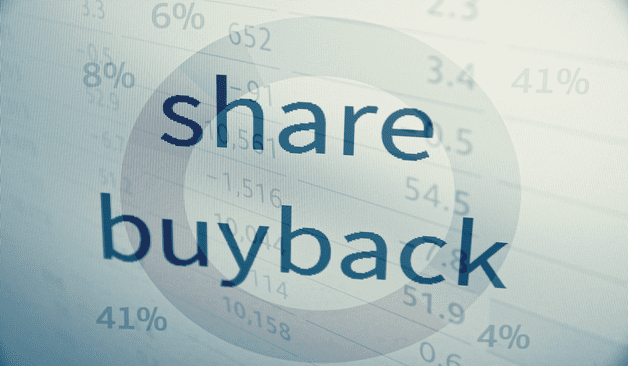
What are share buybacks and should you as a shareholder participate?
What are Share Buybacks?
Share buybacks are financial transactions in which an entity buys from the market its shares which were previously issued to shareholders using its cash. The entity cancels these bought-back shares because it cannot issue its own shares to itself. Since the entity cancels the shares, the outstanding shares reduce to that extent.
Why do companies offer share buyback schemes?
There are several reasons why companies offer to buy back their own shares.
A company could buy back shares if it believes its stock is undervalued. The buyback would help it to cancel the shares bought back, thus increasing the price of the outstanding shares.
It could also opt for a buyback if it has excess cash and no opportunities to invest that cash in new projects. This typically happens with IT companies and blue chip companies because they run matured businesses with little scope for new projects. For instance, Reliance could invest its cash in new businesses but TCS could opt for a buyback scheme.
Dividends paid by companies suffered taxes in two ways besides being a post-tax appropriation. The first was a 15% dividend distribution tax (DDT) paid by the company and the second was the 10% tax paid by shareholders in their individual capacity. However, the Budget 2020 removed DDT and made it taxable in the hands of shareholders at the applicable tax rates. Against this, buybacks would entail only the 10% tax on long-term capital gains tax, thus making it more attractive.
Sometimes, promoters could resort to buybacks to increase their share in the company’s shareholding.
If the company is a target of a predator, then that company can use buyback as a defence strategy to scuttle the chances of the predator obtaining a controlling interest.
Companies also use buyback as one of the ways to reward the performance of their executives.
How do companies offer share buyback schemes?
The company can buy back its shares from the existing shareholders on a proportionate basis through the open market either through a book-building process or through a stock exchange.
The company can also buy back shares from holders of odd lot shares.
In the case of listed companies, promoters cannot participate in buyback through stock exchanges.
In the case of unlisted companies, only the Companies Act applies.
However, there are limits to the amount of buyback that a company can offer.
A recent buyback offer in India
India’s largest software exporter, Tata Consultancy Services (TCS) completed a ₹18,000-crore share buyback offer earlier this year. The TCS offer received 30.12 crore shares, oversubscribed 7.5 times, against an offer of buyback of four crore shares at Rs 4,500 a share, a premium of 21%. TCS is fond of buyback schemes as prior to 2022; it had offered them in 2017, 2018, and 2020.
As an investor, you can also take a look at recently completed buybacks to gauge the effect of it on the respective stock prices. While this will not be an absolute indicator, it can provide a rough idea of the effect of buybacks on a particular stock price.
Should you as a shareholder participate in a share buyback offer?
The decision to tender your shares in a buyback offer is personal, depending on the usual factors you consider for your investments, including your risk appetite. If you hold a substantial amount of shares, you could consider tendering a part of your holdings.
However, you should consider the following factors too before you decide one way or the other:
- The company may get a better valuation for its stock price
- Return on net worth and return on assets and other key ratios could improve over time
- The company could improve its market perception
- The company could create long term value for its shareholders
- The company could provide an exit to investors in volatile times
Remember that theoretically, the value of your current holding will go up after the completion of the buyback offer.
The share buyback offer is another factor you would consider before taking a call on staying invested or tendering the shares as per the provisions of the offer.
How can you participate in the offer?
The company will communicate its offer in various ways to you if you are a shareholder.
If the company you hold shares in is a listed company, it will intimate the stock exchange of general meetings and resolutions passed thereof. Hence, you can get the information from the stock exchanges. You can also get the information from SEBI. Typically, companies make public announcements and news media, especially the business publications cover the news extensively.
There is an elaborate but simple process to tender shares if you want to do so. You will get complete guidance on the way to tender the shares from the company and your broker.
What safeguards are available to you as a shareholder?
A company can offer share buyback schemes as per provisions of various statutes, such as the Companies Act, 2013 and SEBI (Buy-back of securities) Regulations, 2018.
One of the safeguards is that a company may buy back its shares without shareholders’ resolution, to the extent of 10% of its paid up equity capital and reserves, based on both standalone and consolidated financial statements of the company. However, anything more than 10% would need the approval of shareholders.
The laws protect the interests of small shareholders by reserving a percentage of the number of shares bought back to them.
Share buyback is a legitimate strategy available to companies to reassess its performance and standing in the market and make appropriate decisions to improve the value of the company, better the key ratios, and continue to build value for itself and its shareholders.
It is also a viable defence strategy in the event a company perceives a threat from others who may want to control the company by a hostile takeover.
Recent trends seem to indicate that the buyback offers are quite popular, especially for companies with high amounts of cash and not seeing prospects of good investment opportunities.
One of the most important benefits of the buyback offer is the confidence in both shareholders and the management of the ability of the company to perform well on all financial parameters in the future.
Sources:
https://www.sebi.gov.in/sebi_data/faqfiles/aug-2020/1597391100133.pdf
https://www.moneymanagementindia.net/share-buy-backs-in-india/
https://corporatefinanceinstitute.com/resources/knowledge/strategy/stock-buyback-methods/
https://www.nseindia.com/products-services/tender-offer-buyback
https://taxguru.in/company-law/buy-back-shares-companies-act-2013.html
Disclaimer: ICICI Securities Ltd. (I-Sec). Registered office of I-Sec is at ICICI Securities Ltd. - ICICI Venture House, Appasaheb Marathe Marg, Prabhadevi, Mumbai - 400 025, India, Tel No : 022 - 6807 7100. I-Sec is a Member of National Stock Exchange of India Ltd (Member Code :07730), BSE Ltd (Member Code :103) and Member of Multi Commodity Exchange of India Ltd. (Member Code: 56250) and having SEBI registration no. INZ000183631. Name of the Compliance officer (broking): Ms. Mamta Shetty, Contact number: 022-40701022, E-mail address: complianceofficer@icicisecurities.com. Investments in securities markets are subject to market risks, read all the related documents carefully before investing. The contents herein above shall not be considered as an invitation or persuasion to trade or invest. I-Sec and affiliates accept no liabilities for any loss or damage of any kind arising out of any actions taken in reliance thereon. The securities quoted are exemplary and are not recommendatory. Such representations are not indicative of future results. The contents herein above are solely for informational purpose and may not be used or considered as an offer document or solicitation of offer to buy or sell or subscribe for securities or other financial instruments or any other product. Investors should consult their financial advisers whether the product is suitable for them before taking any decision. The contents herein mentioned are solely for informational and educational purpose.
 Invest
Invest



